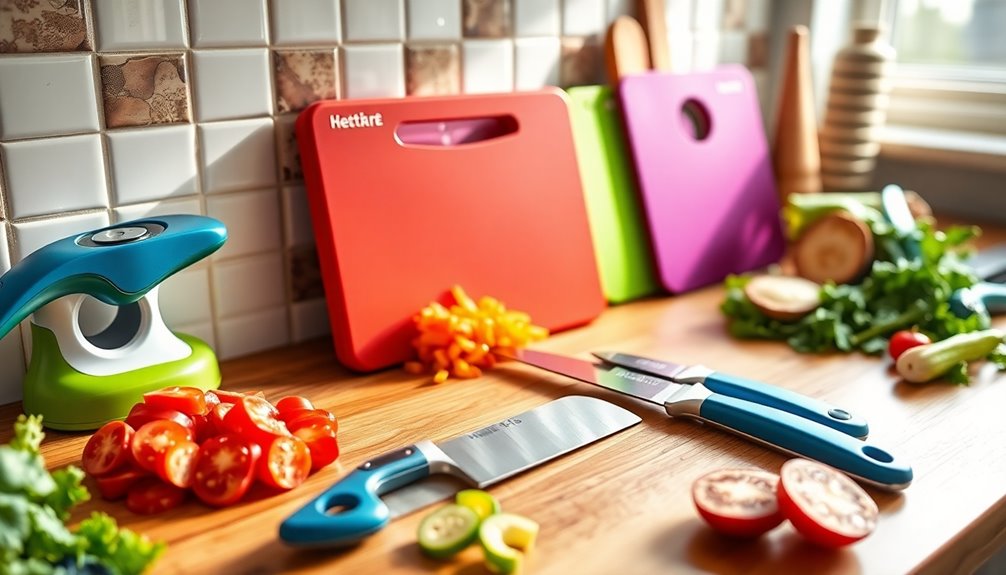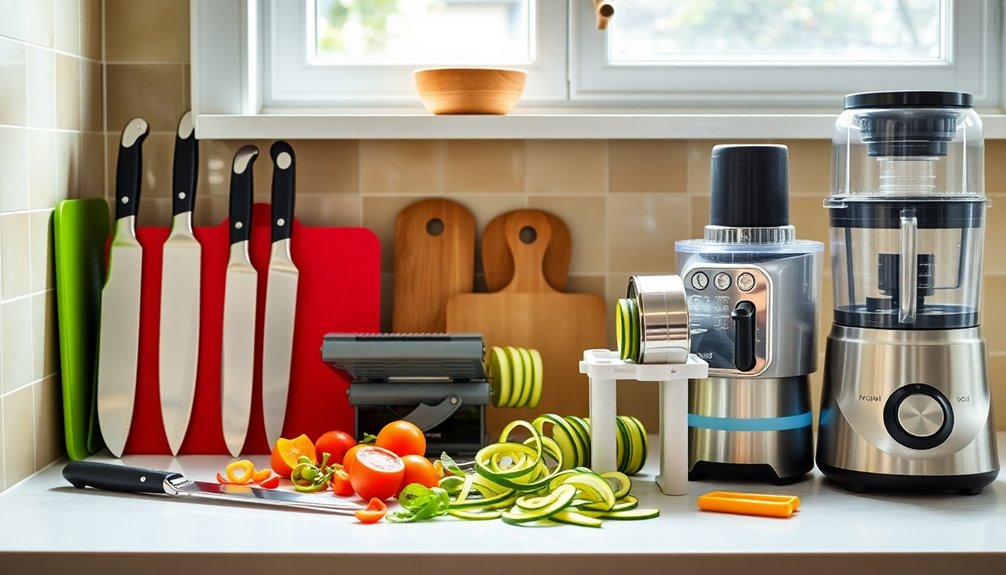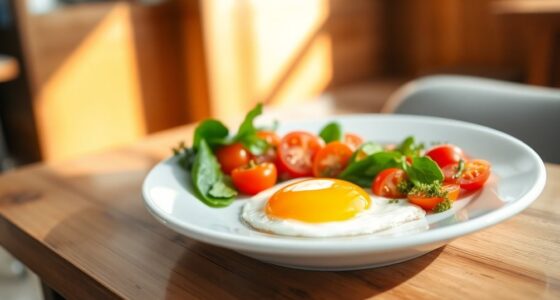If your knife skills are lacking, don’t worry! Investing in the right kitchen gadgets and tools can transform your cooking game. A sturdy cutting board and a reliable knife sharpener can make a huge difference. Try using a mandoline for uniform slices and a cut ruler for precise measurements. With the right accessories, you’ll elevate your dishes while boosting confidence in your kitchen. Stick around; there’s more to discover that can further enhance your knife skills!
Key Takeaways
- Explore gadgets like mandolines for uniform slicing, perfect for those struggling with knife precision.
- Use cut rulers to measure thickness, aiding in achieving consistent cuts without advanced skills.
- Invest in a sturdy cutting board to provide a stable workspace, enhancing safety during food prep.
- A knife sharpener is essential; sharp knives are safer and require less effort, improving overall cutting efficiency.
- Consider specialty tools like food choppers or prep gadgets to simplify tasks and boost confidence in the kitchen.

When you step into the kitchen, having the right tools can make all the difference in mastering your knife skills. A solid set of essential knives is your first step. You’ll want a chef’s knife for most tasks, a paring knife for delicate peeling, and a utility knife for those precise cuts.
If you’re working with meat, a boning knife will help you remove bones, while a cleaver is perfect for heavy-duty jobs like chopping through thick meat.
To wield those knives effectively, you need to master some handling techniques. The pinch grip, where you hold the blade between your thumb and index finger, gives you maximum control. Don’t forget the claw grip for your non-knife hand, keeping your fingers safe while cutting. Sharp knives are safer and require less pressure, making your cutting experience smoother and more efficient.
Mastering knife handling techniques, like the pinch grip and claw grip, ensures safety and control in the kitchen.
Mixing these grips will enhance your dexterity and speed.
As you get comfortable, practice basic cuts like chopping, dicing, and julienne. Knowing how to produce uniform cubes or thin strips will elevate your dishes. You can even venture into specialty cuts like baton and tournée cuts to impress your friends with your newfound skills.
To support your knife practice, invest in accessories that make your life easier. A sturdy cutting board is essential for a stable workspace, while a knife sharpener ensures your tools stay effective.
For precision, use cut rulers to measure thickness, and consider a mandoline for uniform slices.
Lastly, maintaining your knives is key. Regular sharpening keeps them effective, and proper storage prevents accidents. Clean your knives frequently to avoid bacterial growth, ensuring your kitchen remains safe and hygienic.
Frequently Asked Questions
How Do I Improve My Knife Skills Quickly?
To improve your knife skills quickly, start by using a sharp knife and a stable cutting board.
Focus on mastering the proper grip and knuckle alignment to enhance control.
Practice slow, smooth cuts to build muscle memory, and utilize video tutorials for visual guidance.
Regular practice is key—set aside time each week to cut various ingredients.
Don’t forget to sharpen your knives often and keep your workspace clean for safety.
Are There Classes for Learning Knife Skills?
Yes, there are plenty of classes for learning knife skills.
Picture a bustling kitchen with expert chefs guiding you, while at home, you struggle with uneven cuts. Classes like those at Sur La Table and ICE offer hands-on training, whether you prefer in-person or online options.
You’ll master basic techniques, knife care, and even advanced skills. With practice, you’ll slice through ingredients efficiently, gaining confidence and making your culinary experience much more enjoyable.
What Are the Essential Knives for Beginners?
For beginners, having a few essential knives is crucial.
Start with a chef’s knife, which can handle most tasks like chopping and slicing. A paring knife is perfect for smaller jobs, like peeling fruits. If you enjoy bread, a serrated bread knife will make slicing easy.
Focus on quality over quantity, and choose knives that feel comfortable in your hand. With the right tools, you’ll boost your confidence and efficiency in the kitchen!
How Do I Maintain My Kitchen Knives?
Think of your kitchen knives as trusted companions, always ready to assist you.
To keep them sharp and reliable, wash them with mild soap and hot water after each use, then dry them immediately with a towel. Store them in a dry place, away from metal to prevent rust.
Regularly hone and sharpen their edges, and avoid the dishwasher. Treat them with care, and they’ll reward you with years of service in your culinary adventures.
Can I Use Gadgets as a Substitute for Knife Skills?
Absolutely, you can use gadgets as substitutes for knife skills!
Tools like rocker knives and food choppers make cutting and dicing a breeze without needing advanced knife techniques. Adaptive cutting boards hold food in place, while palm peelers simplify peeling tasks.
Kitchen shears and tongs can handle various food prep without constant knife work. These gadgets increase your efficiency and confidence in the kitchen, allowing you to enjoy cooking without worrying about your knife skills.
Conclusion
Whether you’re a culinary novice or just looking to up your game, these 26 kitchen gadgets can truly transform your cooking experience. Did you know that a staggering 80% of home cooks feel insecure about their knife skills? With the right tools, you can slice, dice, and chop with confidence. Don’t let poor knife skills hold you back—equip your kitchen with these essential tools and unleash your inner chef. Happy cooking!









